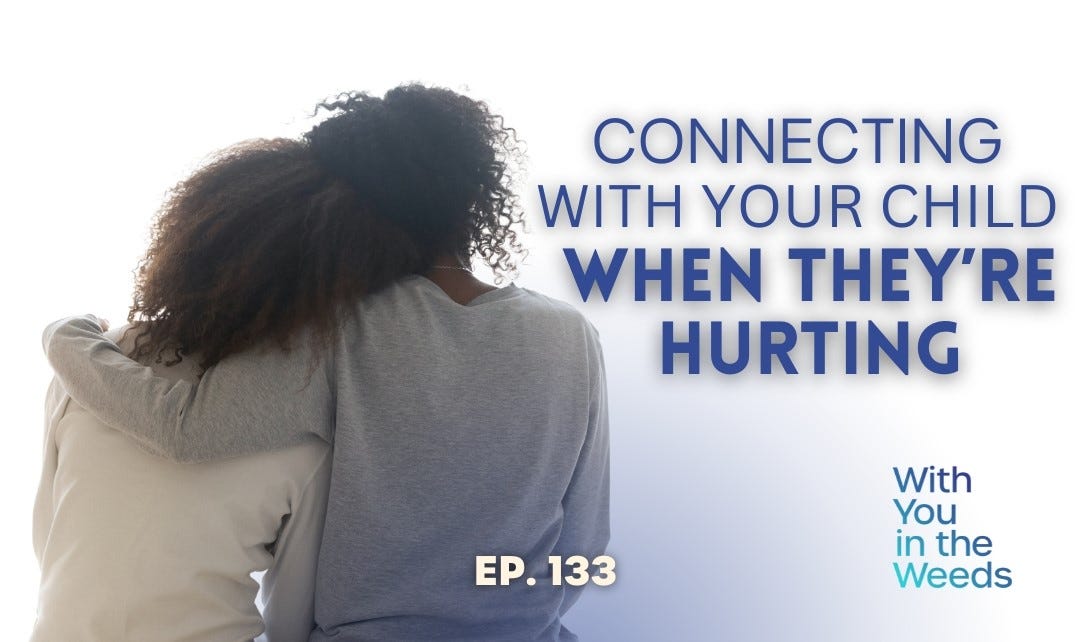Connecting with Your Child When They’re Hurting
Simple ways to offer support
One of the hardest things about being a parent is seeing your child experience pain. When a child is hurting—over something small like a scraped knee, or something deeper, like a friendship falling apart—parental emotional connection is the foundation for them being able to work through and overcome those hardships.
Research shows kids who feel supported by their parents are more resilient. The key is not to fix every problem, but to be present and connected, especially during painful moments, reflecting how God supports you in your distress.
Join Lynn and Austin in this important episode from our ongoing series, Parenting in the Weeds, to learn about:
What hurts kids: in the home, outside the home, and within themselves
Recognizing when your child is hurting
How to respond when your child is hurting
Practical phrases that lead to open conversations with your child
Suicide awareness – signs to look out for
At the end of this episode we’ll speak briefly about suicide. We’ll be devoting a whole episode to that topic later, but we want you to know that we’ll quickly address it here at the end.
Highlights from this Episode
The best way to parent your kids is by using God’s example of how he parents you – through love and limits. Reaching your child’s heart and connecting with them emotionally is the love piece of that equation – and it’s the piece that comes first.
Ironically, connecting with your child emotionally usually happens in the midst of hurt. You can connect with during over joyful moments, but the reality is that everyone experiences painful emotions as part of living in a broken world and that’s often when our hearts are open towards each other.
It’s important to recognize how the Bible describes God's heart towards you when you’re hurting. Psalm 55:16 & 22 says, “As for me, I shall call upon God, and the Lord will save me. Evening and morning and at noon, I will complain and murmur, and he will hear my voice. He will redeem my soul in peace in the battle, which is against me. Cast your burden upon the Lord and he will sustain you. He will never allow the righteous to be shaken.”
What is modeled over and over in Scripture that when you feel afraid, despairing, distressed, forsaken, or grieved in spirit, God listens, he cares, he responds with comfort, and offers you his steadfast love.
In the same way, your kids are sometimes going to feel negative emotions. They’re going to experience distress and hurt and pain. And you have this the incredible opportunity to be with them in their distress, just like God is with you. If you avoid pain and hurt in your child and don’t see it as an opportunity to connect, you will miss the chance to understand them on a deeper level – and model the unconditional love of God to them.
If you avoid pain and hurt in your child and don’t see it as an opportunity to connect, you will miss the chance to understand them on a deeper level – and model the unconditional love of God to them.
What Hurts Kids and Why?
Inside the Home
1. Ignoring your child or showing apathy: Curt Thompson says, “We come into the world looking for someone looking for us.” It should be no surprise that when parents ignore their children, or are apathetic towards their child’s feelings and needs, it hurts!
2. Chronic unresolved stress/tension/conflict in the home: Maybe you’re in a difficult marriage, or a blended family, or you’re managing a child in the home with a diagnosis that makes life turbulent or chaotic. Kids thrive on predictability; when life is unstable, that can create hidden pain in a child’s heart.
3. Failing to lead your child: Kids aren’t always happy with boundaries, but if they don’t have them, they feel unsafe and unloved. Healthy boundaries – around technology, homework, bedtime, eating habits, and behavior – help your child to feel safe and secure.
4. Overloading your child: If your child is in too many sports or other extracurricular activities, it can cause them unnecessary extra stress. Make sure you’re limiting sports and activities and taking your child’s preferences into account.
Another way your child may feel overloaded is if you are burdening them with your own emotional struggles. Be sure not to “parentify” them – find appropriate resources to manage your own difficulties and personal growth.
Outside the Home
1. Education and social challenges: Academic and behavioral stress at school, social dynamics, friendships, bullying (online or in person), peer pressure, and unsympathetic teachers and coaches can cause a lot of stress.
Keep lines of communication open with your child so that they can share their struggles with you. Make sure you have healthy and wise limits on technology – especially their phones – so that they are not exposed to violent and pornographic content online.
2. Trials of life that they can’t control: Accidents, illnesses, learning limitations, divorce, or loss of a loved one. Kids aren’t little adults, and they’ll need help navigating trials when they happen.
3. Kids’ own choices: Kids are lovely and delightful…and they can be stubborn, and annoying, and choose to disobey. Even when it’s no one’s fault but their own, you can still try to connect with them in the midst of correcting.
How to Recognize that Your Child is Hurting
Most of the time, your child isn’t going to walk up to you and say, ‘Hey, Mom, Dad, I’m sad.’ You’ve got to watch for it. It shows up in their behavior sometimes when they’re acting out, maybe withdrawing. Maybe they’re slamming doors in the house, picking on their brother or sister, or complaining more.
Body language says a lot - so although kids may not be able to verbalize their feelings, if you’re attuned to your child, you can notice subtle changes in their affect or facial expressions like slumped shoulders, monotone speaking, not smiling, or a scrunched up face or furrowed brow.
5 Steps to Connecting with Your Child When They’re Hurting
1. Get down on their level and look them in the eye: Looking at your child while talking with them is a simple way to show respect. Don’t force your child to look you in the eye, but show warmth and a desire to connect. Reassure them that you love them and are there for them no matter what.
2. Help them name their emotion: Ask them to name the emotions they are feeling. A Feeling Word List is a handy tool for this – you can find a free one at our website under Free Downloads.
3. Listen, validate, and empathize: Dismissing, minimizing, and invalidating their feelings makes them feel unseen and unloved. Instead, connect with them by listening without interrupting, validating their feelings, and offering empathy.
4. Use questions to engage your child’s thoughts and feelings:
What are you feeling?
How long have you felt this way?
How did you experience what happened?
What did you really wish for when this happened?
What was the worst part of it for you?
What are you most afraid will happen if you talk about this?
What makes you feel comforted?
What do you need from me right now?
5. Use statements to affirm their openness and vulnerability:
Tell me more.
I’m listening.
I’m here for you.
Nothing is off limits.
I value your feelings.
I can see that you’re hurting.
I can tell that this is important to you.
I’m curious about your thoughts.
Thank you for sharing with me.
I understand why you feel that way.
Suicide Awareness
There are times when your child’s negative feelings will be overwhelming, and they may struggle with depression, anxiety, and self-loathing.
Three things to keep an eye on are:
Thoughts – Do they think suicide is the only solution for their pain?
Means – Do they have access to any means of hurting themselves?
Plan – Have they come up with a plan for self-harm?
Suicidal ideation (pondering or fantasizing about suicide) and intrusive thoughts of self-harm are surprisingly common. Bringing up this topic does not increase your child’s odds of acting on their thoughts. The time to be very concerned is if they have the means or have come up with a plan.
Calling the National Suicide Lifeline (988) is a helpful short-term solution – you and/or your child will be able to speak with someone who understands what they are going through.
A longer-term solution is to get your child professional help. A psychiatrist will be able to diagnose them and recommend a treatment plan (including medication, if necessary). A counselor or therapist will help them identify their feelings, heal from trauma, and find healthy coping strategies for depression, anxiety, and thoughts of self-harm.
Giving Them the Gift of Your Presence
It’s your job as a parent to recognize and be aware of potential stressors in your kids' lives, intervene when necessary, and walk beside them with compassion when you see them struggling. They need your guidance more than they’re willing to admit! When you’ve built a groundwork of trust and understanding with them, they will have soft hearts to heed your warning or correction, follow the guidelines you set for your family, and hear the truth in love when you share it.
Recommended Resources
National Suicide Lifeline - call 988





